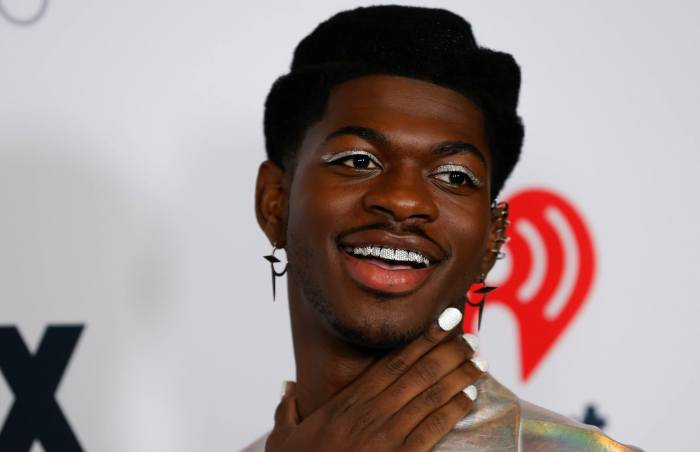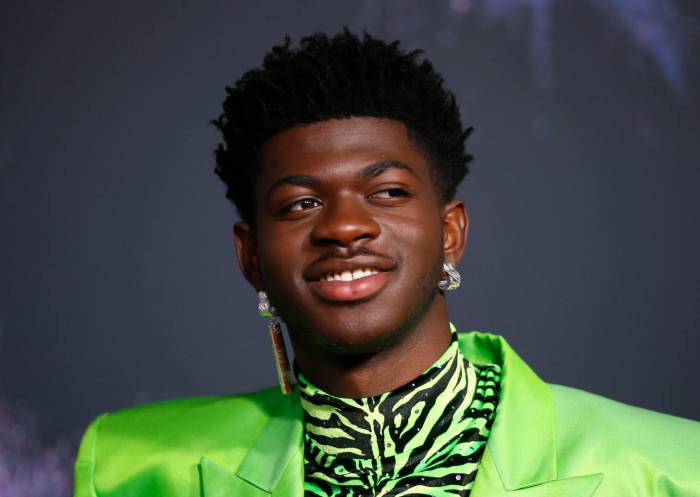Back when reality TV became popular, it was common to hear complaints about celebrities “becoming famous for being famous.” What this really meant was that they hadn’t proven themselves in a respected field of endeavor, like acting or music. If they did pursue those fields, they were seen as secondary. Paris Hilton’s “Stars Are Blind” has stood up well as a dance club bop, but it’s not the reason we still remember her.
Lil Nas X’s “Old Town Road” is the main reason we’re still talking about him, so it’s not exactly true to lump him into this category. But while he’s a rapper and singer, his music has often seemed secondary to a multimedia art project encompassing videos, his social media feed, and even stunts like limited-edition “Satan shoes” containing a drop of human blood. Those shoes didn’t seem intended merely to promote his song “Montero (Call Me By Your Name).” If anything, the song and shoes were on an equal footing, no pun intended.
Lil Nas X made history by coming out in the middle of his historic 19-week run at number one with “Old Town Road.” His “7” ep felt rushed, leaping from genre to genre with no real sense of passion for any of them. “Old Town Road” proved more durable than its meme-rap origins suggested, but I didn’t expect him to have a career beyond it. “Mambo #5” and “Gangnam Style” were huge hits in their times, but do Lou Bega and PSY still have any audience in the US? When Lil Nas X came out, I thought that his open gayness would allow him to reach a second act. (On “One of Me,” he speaks from the voice of his critics to worry “I don’t see you lasting long and that’s a promise.”) The impersonal nature of “7” made more sense knowing it was coming from the closet.
Unfortunately, Lil Nas X has mostly gotten the public’s attention when he’s provoking them. The video for “Montero (Call Me By Your Name),” in which he has sex with an alien in the garden of Eden, then descends down a stripper pole to hell, gives Satan a lap dance, kills him, and takes over hell, and “Industry Baby,” featuring nude dancing in jail, triggered anger from conservative pundits, only making him look cooler. In between, he released the second single from “Montero,” “Sun Goes Down.” Given a rather sweet visual in which he looks back at his prom (held only four years ago) and reimagines attending it as an out gay teen, it didn’t exactly bomb — 67 million Spotify streams would be a raging success for most artists — but it was ignored by the media and radio.
Lil Nas X has been perceived as a pop star who sometimes raps rather than be a part of hip-hop culture. “Industry Baby” is his most convincing attempt at making a rap banger. Tyler, the Creator and Brockhampton member Kevin Abstract are the only other out queer men who’ve succeeded in mainstream hip-hop, and even Tyler, with two platinum albums, has never reached an audience as wide as Lil Nas X. His casual declaration on “Industry Baby,” propelled by triumphant horns, which hit number 2 on Billboard’s top 100, that ‘I don’t f**k b*****s, I’m queer” is something new for an artist at this level of popularity.
On “Montero,” Lil Nas X works overtime to compensate for the generic tendencies of “7.” The lyrics juxtapose his rise to fame with his mother’s struggles with drugs. He looks back at the terrors of being a closeted teenager, when he prayed that God would turn him heterosexual. He relates his life story, with sex playing as large a part in it as it does in many heterosexual artists’ lyrics.
Musically, “Montero” is less singular. Strangely, its combination of genres, mixing pop, rock, and hip-hop influences never expresses much real personality. The production feels calculated for airplay on as many radio formats as possible. The title track and “What I Want,” essentially a soft rock ballad, follow the recent tendency to mix guitars with trap beats. “Life After Salem” sports a guitar solo straight out of ‘80s hair metal. “Sun Goes Down” stands out for matching its heartfelt lyrics with music that fully supports them, where “Void” aims for a sparer sound to match its pensive lyrics and doesn’t quite find it.
“Montero” is a big step up from “7,” but it feels calculated to reach the widest audience possible. “Old Town Road” was appealing because its mix of country and rap didn’t feel pre-packaged or destined for success. Instead of becoming one of the biggest hits in pop music history, it could easily have fallen through the cracks of the vast quantity of music designed for TikTok virality. But the syrupy production of “Am I Dreaming” closes the album on a sour note. (Out pop star Doja Cat improves “Scoop” by introducing the loopiness of vintage Missy Elliott and Nicki Minaj. The pansexual, non-binary Miley Cyrus and gay rock legend Elton John also get features, but the latter only plays piano.) Many backing tracks could’ve been offered to Post Malone instead.
We know a lot more about Lil Nas X as a person from “Montero,” but we don’t learn much about how music excites him.
LIL NAS X | “Montero” | Columbia Records



































